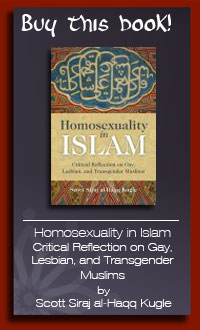





Sexual diversity in Islam:
Is there room in Islam for lesbian, gay, bisexual and transgender Muslims?
By Dr. Scott Siraj al-Haqq Kugle | Adapted for MPV by Tynan Power
© 2010 Muslims for Progressive Values
Page: Preface | 2 | 3 | Notes 1 | Notes 2 | Notes 3 | Notes 4
Understanding sexual diversity in Islam
Is there room in Islam for lesbian, gay, bisexual and transgender Muslims?
By Dr. Scott Siraj al-Haqq Kugle | Adapted for MPV by Tynan Power
© 2010 Muslims for Progressive Values
Page: Preface | 2 | 3 | Notes 1 | Notes 2 | Notes 3 | Notes 4
Understanding sexual diversity in Islam
Some religions seem to view sex as shameful or unclean. Is that true of Islam?
No. In early Islamic history, sex was seen as a positive part of human life. The Prophet Muhammad(PBUH) helped people see that spiritual life and sexual life are connected. Early Muslim scholars talked about sex in a very straight-forward way as a normal, positive part of life. Al-Ghazali, a Muslim scholar who lived more than 900 years ago, called sexual pleasure a blessing from God. Even the Qur'an (the Muslim holy book) describes heaven as a paradise of a physical kind. Heaven is described as containing "rewards" such as rivers of milk and honey that make it appealing to the senses—including sexual desires.
Is sexuality the same as "lust"?
No. Sexuality is about a lot more than desire or "lust." Sexuality involves desire, but also includes thoughts, acts, and how one sees oneself and others. It is part of a person's identity. It affects how people relate to each other. It's important to realize, too, that desire itself is not a bad thing in Islam. There is a well-known hadith, or story about the life of the Prophet Muhammad(PBUH), in which the Prophet said "Three things were made beloved to me in this world of yours: women, perfume and prayer." This hadith indicates that sexual desire is something the Prophet cherished.
Is sexuality only considered "good" if it is used to create children?
No. The Prophet Muhammad(PBUH) and early scholars said that "sexual play" is a good thing. In fact, in one hadith, Muhammad said that God rewards people for "sexual play." The term "sexual play" is not defined in the Qur'an or Hadith. Some people understand it to mean sex acts other than intercourse. "Sexual "play" does not necessarily lead to making children, so this indicates that sex is considered good and healthy whether or not it is for the purpose of creating children.
So, in Islam, is it "anything goes" when it comes to sex?
No. There are limits. Most of those limits have to do with relationships between people who have sex. The limits don't have to do with the sex acts themselves, though. For example:
*In Islam, brothers and sisters cannot marry. There are verses of the Qur'an that specifically mention who can and can not marry. This limit prevents men and women who are closely related from creating children who may have serious health risks.
*In Islam, men and women should not have sex if they do not have a known, clear relationship with each other. This limit helps ensure that children will be cared for and supported by both parents. This limit was especially important for women at a time when men had more opportunities to work and earn money. Clear relationships also help both people in a relationship to know what they can expect from each other—what rights and responsibilities they have.
Is Islamic law clear on what is and isn't permissible?
In some cases—like in the Qur'an verses that say brothers and sisters can not marry—it is clear. In other cases, it is not so clear. Scholars today often talk about Islamic law as if it were always clear and simple. Actually, Islamic law is pretty complex. The law comes from many sources, not just the Qur'an. Some of those sources disagree with each other and most are based on the opinions of human beings. In some cultures, Islamic law follows the teachings of scholars with one viewpoint, while in other cultures Islamic law may follow different scholars with different views. (There is more about Islamic law, below.)
At the Prophet's time, was sex only permitted between a formally-married husband and wife?
No. Sex was allowed as part of a number of relationships. Most of these relationships involved a kind of contract, or agreement. Some relationship contracts were formal. A formal marriage would include witnesses and the marriage agreement might be written down and signed. Other relationship contracts were informal—they were understood by the community at the time but might not be written down or include a formal ceremony with witnesses. In the time of the Prophet Muhammad(PBUH), sex could be part of informal contract relationships, such as "temporary marriages." When slavery was legal, sexual relationships between slaves and their owners also was permitted.
Today, we usually don't think of marriages and other relationships "contracts," but many relationships are based on an agreement of some kind. Some relationship agreements are written down and legally tie people together, while other relationship agreements are made orally (by talking).
Aren't Islamic rules about sex only about relationships between men and women?
Not necessarily. The Qur'an gives rules for relationships between men and women, but it doesn't set rules for same-sex (gay or lesbian) relationships. That doesn't mean it forbids relationships between people of the same sex. There were a number of reasons why Islamic law focused on relationships between men and women. For one thing, Muslim jurists saw straight, or heterosexual, relationships as the major concern because they led to pregnancy. Same-sex couples may have or raise children but, for them, having children is not an accidental side-effect of having sex.
The early Muslim jurists wanted to avoid situations where a child was born without the support a father could bring. At that time, men earned the most income and few women had substantial income of their own. Because of inequality between men and women, having a man in the family helped the family financially and socially.
Another reason Islamic jurists talked a lot about straight relationships is that they were trying to address the needs of most people. Since most people are straight (or heterosexual), their needs were the primary concern of scholars. That does not mean that other sexual identities don't exist. It also doesn't mean that other sexual identities are forbidden just because they are not mentioned.
Why is sex such a "hot" topic among Muslims?
There are two main reasons why sex is such a "hot" topic. Rules about sex and gender can be used to keep men in positions of power over women. Rules about sexual relationships are often bent to benefit men, rather than staying true to the rule as it is in the Qur'an. For example, in many Islamic cultures, when women have sex with men before marriage it brings shame on them and their families. No similar shame is brought on a man's family if he has sex before marriage. The Qur'an doesn't make any distinction between the sin of the two people involved, though. When the rule is bent to bring more shame and harsh punishments on women, it means women have a lot to lose if they have sex before marriage, while men do not face the same risks. The rule works to control women, but it allows men to do what they wish.
Another reason sex is a "hot" topic among Muslims has to do with politics. Many Islamic countries were colonized by non-Muslim European countries. The colonial rulers replaced Islamic legal systems with European laws. Even after the colonial rulers left, many Muslims felt as if their way of life was threatened. Some Muslims who immigrate to the U.S. or other western countries also fear that their culture will be lost in their new country. When people feel threatened and fearful, they often try to keep control over whatever they can. Limiting sex and women's rights can seem like easy ways to feel more "in control."
Read on to learn about homosexuality in the Qur'an.
Page: Preface | 2 | 3 | Notes 1 | Notes 2 | Notes 3 | Notes 4
No. In early Islamic history, sex was seen as a positive part of human life. The Prophet Muhammad(PBUH) helped people see that spiritual life and sexual life are connected. Early Muslim scholars talked about sex in a very straight-forward way as a normal, positive part of life. Al-Ghazali, a Muslim scholar who lived more than 900 years ago, called sexual pleasure a blessing from God. Even the Qur'an (the Muslim holy book) describes heaven as a paradise of a physical kind. Heaven is described as containing "rewards" such as rivers of milk and honey that make it appealing to the senses—including sexual desires.
Is sexuality the same as "lust"?
No. Sexuality is about a lot more than desire or "lust." Sexuality involves desire, but also includes thoughts, acts, and how one sees oneself and others. It is part of a person's identity. It affects how people relate to each other. It's important to realize, too, that desire itself is not a bad thing in Islam. There is a well-known hadith, or story about the life of the Prophet Muhammad(PBUH), in which the Prophet said "Three things were made beloved to me in this world of yours: women, perfume and prayer." This hadith indicates that sexual desire is something the Prophet cherished.
Is sexuality only considered "good" if it is used to create children?
No. The Prophet Muhammad(PBUH) and early scholars said that "sexual play" is a good thing. In fact, in one hadith, Muhammad said that God rewards people for "sexual play." The term "sexual play" is not defined in the Qur'an or Hadith. Some people understand it to mean sex acts other than intercourse. "Sexual "play" does not necessarily lead to making children, so this indicates that sex is considered good and healthy whether or not it is for the purpose of creating children.
So, in Islam, is it "anything goes" when it comes to sex?
No. There are limits. Most of those limits have to do with relationships between people who have sex. The limits don't have to do with the sex acts themselves, though. For example:
*In Islam, brothers and sisters cannot marry. There are verses of the Qur'an that specifically mention who can and can not marry. This limit prevents men and women who are closely related from creating children who may have serious health risks.
*In Islam, men and women should not have sex if they do not have a known, clear relationship with each other. This limit helps ensure that children will be cared for and supported by both parents. This limit was especially important for women at a time when men had more opportunities to work and earn money. Clear relationships also help both people in a relationship to know what they can expect from each other—what rights and responsibilities they have.
Is Islamic law clear on what is and isn't permissible?
In some cases—like in the Qur'an verses that say brothers and sisters can not marry—it is clear. In other cases, it is not so clear. Scholars today often talk about Islamic law as if it were always clear and simple. Actually, Islamic law is pretty complex. The law comes from many sources, not just the Qur'an. Some of those sources disagree with each other and most are based on the opinions of human beings. In some cultures, Islamic law follows the teachings of scholars with one viewpoint, while in other cultures Islamic law may follow different scholars with different views. (There is more about Islamic law, below.)
At the Prophet's time, was sex only permitted between a formally-married husband and wife?
No. Sex was allowed as part of a number of relationships. Most of these relationships involved a kind of contract, or agreement. Some relationship contracts were formal. A formal marriage would include witnesses and the marriage agreement might be written down and signed. Other relationship contracts were informal—they were understood by the community at the time but might not be written down or include a formal ceremony with witnesses. In the time of the Prophet Muhammad(PBUH), sex could be part of informal contract relationships, such as "temporary marriages." When slavery was legal, sexual relationships between slaves and their owners also was permitted.
Today, we usually don't think of marriages and other relationships "contracts," but many relationships are based on an agreement of some kind. Some relationship agreements are written down and legally tie people together, while other relationship agreements are made orally (by talking).
Aren't Islamic rules about sex only about relationships between men and women?
Not necessarily. The Qur'an gives rules for relationships between men and women, but it doesn't set rules for same-sex (gay or lesbian) relationships. That doesn't mean it forbids relationships between people of the same sex. There were a number of reasons why Islamic law focused on relationships between men and women. For one thing, Muslim jurists saw straight, or heterosexual, relationships as the major concern because they led to pregnancy. Same-sex couples may have or raise children but, for them, having children is not an accidental side-effect of having sex.
The early Muslim jurists wanted to avoid situations where a child was born without the support a father could bring. At that time, men earned the most income and few women had substantial income of their own. Because of inequality between men and women, having a man in the family helped the family financially and socially.
Another reason Islamic jurists talked a lot about straight relationships is that they were trying to address the needs of most people. Since most people are straight (or heterosexual), their needs were the primary concern of scholars. That does not mean that other sexual identities don't exist. It also doesn't mean that other sexual identities are forbidden just because they are not mentioned.
Why is sex such a "hot" topic among Muslims?
There are two main reasons why sex is such a "hot" topic. Rules about sex and gender can be used to keep men in positions of power over women. Rules about sexual relationships are often bent to benefit men, rather than staying true to the rule as it is in the Qur'an. For example, in many Islamic cultures, when women have sex with men before marriage it brings shame on them and their families. No similar shame is brought on a man's family if he has sex before marriage. The Qur'an doesn't make any distinction between the sin of the two people involved, though. When the rule is bent to bring more shame and harsh punishments on women, it means women have a lot to lose if they have sex before marriage, while men do not face the same risks. The rule works to control women, but it allows men to do what they wish.
Another reason sex is a "hot" topic among Muslims has to do with politics. Many Islamic countries were colonized by non-Muslim European countries. The colonial rulers replaced Islamic legal systems with European laws. Even after the colonial rulers left, many Muslims felt as if their way of life was threatened. Some Muslims who immigrate to the U.S. or other western countries also fear that their culture will be lost in their new country. When people feel threatened and fearful, they often try to keep control over whatever they can. Limiting sex and women's rights can seem like easy ways to feel more "in control."
Read on to learn about homosexuality in the Qur'an.
Page: Preface | 2 | 3 | Notes 1 | Notes 2 | Notes 3 | Notes 4
MPV thanks the generous contribution of the Human Rights Campaign for making this adaptation possible.

